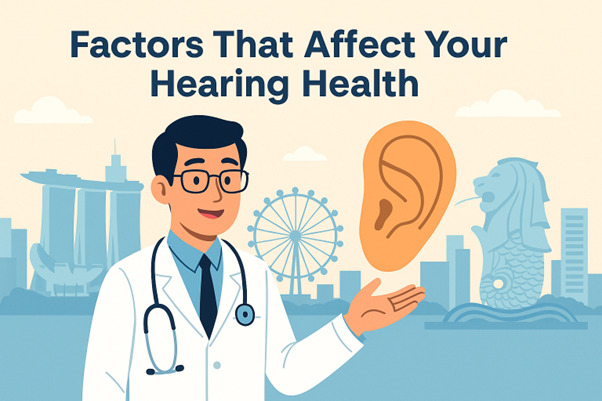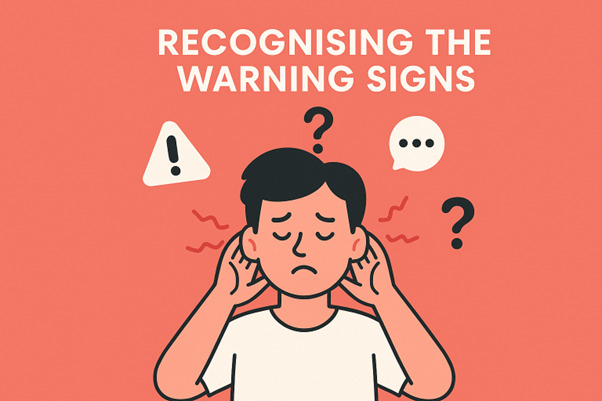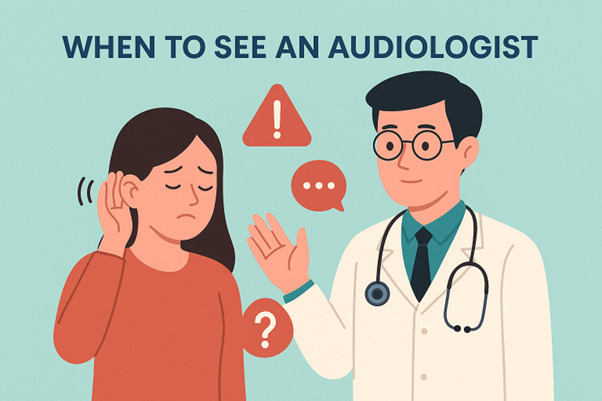
How Lifestyle Choices Influence Hearing Health and When to Visit an Audiologist
Hearing is something many of us take for granted until problems begin to appear. It plays a vital role in how we connect with others, enjoy our environment, and maintain independence. While ageing and genetics have an undeniable impact, the way we live our daily lives can strongly influence the long-term health of our ears.
By understanding which habits support hearing and which ones place it at risk, you can take control of your auditory health. With the right lifestyle choices and timely visits to a specialist, it is possible to preserve your hearing for many years to come.
Key Lifestyle Factors Affecting Hearing
Noise Exposure
Noise is one of the most common and preventable causes of hearing loss. Regular exposure to high sound levels, whether from construction sites, concerts, or headphones, can gradually damage the delicate hair cells in the inner ear. Once these cells are harmed, they do not regenerate, leading to permanent hearing difficulties.
Practical steps include:
- Using earplugs at concerts or noisy workplaces
- Keeping personal listening devices at safe volumes
- Allowing your ears rest periods after loud exposure
Diet and Nutrition
What you eat influences not only your weight and heart but also the health of your ears. Research shows that nutrients such as omega-3 fatty acids, zinc, magnesium, potassium, and vitamins A, C, and E are linked with supporting auditory function. These nutrients help maintain blood flow to the inner ear and may protect cells from damage.
Including foods such as oily fish, legumes, bananas, broccoli, and whole grains provides a strong foundation for general wellbeing. While nutrition alone cannot guarantee protection from hearing loss, a balanced diet ensures your auditory system has the resources it needs to function at its best.
Cardiovascular Health
Good circulation is essential for every part of the body, including the ears. The inner ear relies on tiny blood vessels to supply oxygen and nutrients. If your cardiovascular system is compromised, your hearing may be affected as a result.
Exercise such as brisk walking, cycling, or swimming supports healthy circulation and reduces the risk of high blood pressure, which has been linked to hearing problems. Making physical activity part of your routine benefits both your ears and overall vitality.
Smoking and Alcohol
Smoking introduces harmful chemicals into the body that impair the structures responsible for processing sound. It has also been linked to an increased risk of tinnitus.
Alcohol, especially when consumed heavily, can affect the clarity of hearing and make it harder to follow conversations in noisy settings. While some of these effects may be temporary, studies suggest that repeated or long-term excessive use increases the likelihood of lasting hearing problems. Moderating these habits or avoiding them altogether can help protect your auditory system.
Medication and General Health
Certain medicines, known as ototoxic drugs, can affect hearing and balance. These may include some antibiotics, chemotherapy agents, and high-dose pain relievers. While often necessary, their potential side effects should not be overlooked.
Managing chronic conditions such as diabetes or hypertension is also important, as poorly controlled health issues can indirectly damage auditory pathways. Caring for your body holistically supports the resilience of your hearing.
Recognising the Warning Signs

Difficulty Following Conversations
One of the earliest indicators of hearing decline is struggling to keep up with conversations, particularly in noisy settings. You may find yourself asking people to repeat themselves or feeling drained after social interactions.
Tinnitus and Persistent Sounds
Ringing, buzzing, or hissing in the ears is a signal that your hearing may be under strain. Tinnitus should never be dismissed, especially if it occurs frequently or disrupts concentration and sleep.
Changes in Listening Habits
Turning up the volume on the television or radio more often than before, or having family comment on how loud it is, can indicate changes in hearing sensitivity.
Sudden or Unexplained Loss
A sudden drop in hearing in one or both ears should be treated as urgent. Prompt treatment by an ear specialist gives the best chance of improvement, though not all cases can be reversed. Early intervention remains critical to preserving any remaining function.
When to See an Audiologist

Situations Requiring Professional Assessment
You should consider booking an appointment if you experience:
- Persistent difficulty hearing conversations
- Sudden changes in hearing ability
- Ongoing tinnitus or ringing in the ears
- Trouble understanding speech in noisy settings
Importance of Early Intervention
An audiologist can identify subtle changes you may not notice yourself. With tailored advice and professional assessments, interventions can be made before hearing loss significantly affects your daily life. Regular monitoring is especially useful if you have a family history of hearing problems.
Routine Hearing Checks
Even without obvious symptoms, periodic assessments are wise. Just as we visit optometrists for our eyes or dentists for our teeth, ears also deserve professional care. A trusted audiologist clinic ensures that your hearing health is monitored and preserved over time.
If you live in Southeast Asia, booking a consultation at a reputable hearing clinic in Singapore offers convenience and access to expert care. An experienced audiologist Singapore can provide detailed assessments and practical solutions suited to individual needs.
Proactive Steps for Long-Term Hearing Health
Looking after your ears is not complicated, but it requires consistency. Protect your ears from loud noise, eat a balanced diet, and stay active. Avoid habits such as smoking and heavy alcohol use, which place unnecessary strain on your auditory system.
Scheduling routine hearing tests should be part of your overall health plan. An audiologist can help identify risks early and recommend strategies to maintain strong hearing. Combining professional care with healthy lifestyle habits ensures you safeguard one of your most valuable senses.
Conclusion
Your hearing is influenced by many factors, and while you cannot change your genetics, your daily choices make a significant difference. By paying attention to noise exposure, nutrition, cardiovascular health, and lifestyle habits, you take active steps to support your auditory system.
Knowing when to seek professional advice is equally important. Whether you notice changes in your hearing or simply want peace of mind, consulting an audiologist provides reassurance and guidance. With the right support and healthy routines, you can continue to enjoy the sounds that enrich your life for years to come.